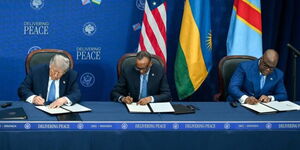A sudden wave of WhatsApp account suspensions has left hundreds of Kenyans grappling with restricted access to the popular messaging app.
Social media platforms are awash with reports of users being logged out of their accounts without warning, echoing a similar mass suspension that took place five years ago. Many users have shared a consistent experience: they were actively using the app when they were abruptly logged out, across multiple devices.
While the ban appears to have affected users beyond Kenyan borders, the timing and nature of the suspension have sparked questions.
Why it matters: WhatsApp has become a primary means of communication with nearly 14 million users. According to data from Meta, Kenya has the highest percentage of monthly WhatsApp users compared to the rest of the world, with an astonishing 97 per cent of internet users who use WhatsApp every month.
Dig deeper: One user recounted their ordeal, telling Kenyans.co.ke, “I was logged in on both my phone and laptop when suddenly I got logged out from both. It was really strange.”
The message displayed on their screens read, “This account no longer uses WhatsApp. Chats are still on this phone.”
Frustrated users have been directed to wait for a review, which WhatsApp promises will be completed within 24 hours. “We will notify you in WhatsApp,” the message continues, leaving many in suspense as to when or whether they will regain access.
While the reasons for the bans are still unclear to many, WhatsApp's guidelines offer some insight. The platform has reiterated that accounts found violating its terms of service will be banned.
WhatsApp policies: This includes sending unwanted or automated messages, creating unauthorised accounts, and using modified versions of the app, such as GBWhatsApp and YoWhatsApp—clone apps that have been widely popular among some Kenyan users.
Meta, the parent company of WhatsApp, has ramped up efforts to combat the use of these unauthorised versions of the app, which has coincided with the current wave of suspensions.
The crackdown on these clone apps appears to have hit Kenya hard, where their use has been rampant. “We use machine learning and user reports to identify and ban accounts that violate our policies,” Meta stated in a statement in May.
WhatsApp’s Terms of Service also highlight other prohibited activities that could lead to an account ban. These include sharing contact lists without permission, overusing broadcast messages, and engaging in harmful or unlawful behaviour such as publishing false information or promoting hate speech.
The trend: The timing of the crackdown is particularly significant, coming just months after data from the Communications Authority of Kenya (CA) revealed a notable shift in social media usage patterns. According to the CA, WhatsApp’s market share fell by 0.3 per cent in the first quarter of the year, coinciding with a rise in Facebook’s popularity.
Facebook, another Meta-owned platform, overtook WhatsApp as the most-used social media platform in Kenya during this period, with 49.4 per cent of the adult population using it, compared to WhatsApp’s 47 per cent.
The suspicion that WhatsApp's latest wave of bans might be linked to Meta's effort to eliminate competition from its clone apps has only fuelled the growing frustration.
Despite WhatsApp’s dominance in Kenya for nearly a decade, the increasing restrictions and crackdowns have driven some users to abandon the platform altogether.
The reasons for the bans may vary, but what remains certain is that many Kenyans feel alienated by the platform they once trusted for daily communication. As the review process unfolds, it remains to be seen whether WhatsApp will restore these accounts or if the bans will become a lasting trend in the country’s digital landscape.
For now, many are left anxiously awaiting WhatsApp’s verdict, while others have begun exploring alternative messaging platforms, wary of future suspensions.












